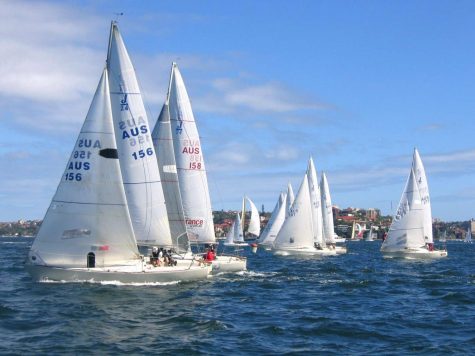I’m on a Boat
Donald Redlinger and Competitive Sailing
October 4, 2021
 Sailboat racing comes in a variety of shapes and sizes. There are innumerable types of sailboats and practically limitless sailing environments. Despite the numerous uncertainties, sailboat racing is an interesting, dynamic, and thrilling sport! One of our very own students, Donald Redlinger is a competitive racer.
Sailboat racing comes in a variety of shapes and sizes. There are innumerable types of sailboats and practically limitless sailing environments. Despite the numerous uncertainties, sailboat racing is an interesting, dynamic, and thrilling sport! One of our very own students, Donald Redlinger is a competitive racer.
“I’ve always sailed on the East coast with my family. We go every summer and I sail all summer. We race on the bay where other people hold regattas, I race a boat called a laser which is a one man boat, I do really well in heavy wind because of my smaller sail on the laser,” said DJ, who is also a part of the boys soccer team. “I’ve won multiple accolades for my club out in the east. I do plan on pursing this more, I think I’m good at sailing and it’s fun for me, I plan to start trying to sail out here more in Colorado this up coming year too.”
Fleet Racing
The most popular form of competitive sailing is fleet racing, which includes racing boats around a course. There are two types of fleet racing: one-design and handicap. One-design boat racing, as seen at the Olympic Sailing Competition, means that all of the boats competing are identical – they have the same design, sail area, and so on. Different types of racing boats can compete against each other in handicap racing. Each boat has a handicap or rating that can be used to adjust completion times or decide start times so that the slowest boats go first.
Match Racing
Two identical racing boats compete against each other in a match race. The goal is to be the first to reach the finish line in this one-on-one battle of strategy and tactics. A windward/leeward course is always used in match racing, and each race takes about 20 minutes to complete.
Team Racing
Two sailing teams, each with three racing boats, compete against one another in team racing. It’s a high-octane racing style that requires outstanding boat handling skills and quick tactical decisions. The sailing teams will compete to see who can get the best combination of spots — the team with the lowest score wins. First place receives a score of 1, second place receives a score of 2, and so on. Even if one of the team’s boats wins the race, they are not guaranteed victory because they must have a total score of ten or fewer to win (2, 3, 5 = 10 points vs. 1, 4, 6 = 11 points).

